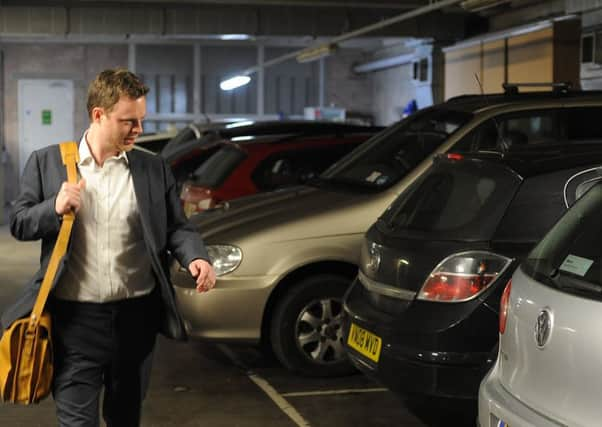Helen Martin: Workplace parking levy is a non-starter


It’s rather unfortunate that even before leaving the EU is settled, resolved, or (please God) dismissed, Scotland has another complex issue arising with the Greens’ pressure on the SNP government to introduce a tax to park at work.
It may have a serious financial whack on businesses if they have to pick up the tab but in Edinburgh, my hero of last week, council leader Adam McVey, has declared he wants staff, not employers, to pay the levy.
Advertisement
Hide AdAdvertisement
Hide AdWell, let’s start with businesses. The government is insisting hospital and NHS buildings should be exempt. Obviously, there is no point in demanding tax from an essential public service that’s underfunded.
Yes, as Labour has suggested, the same could apply to other stretched public services such as state schools, fire stations, and police premises. But where can the line be drawn when it comes to spaces at council offices, swimming pools, golf clubs or private hospitals etc?
The Green plan is not a tax on the “better off”. The aim is to discourage people from driving cars and herd them on to public transport in order to get to work. It’s all about the environment.
But with £400 a year per head, is it realistic to charge individual members of staff, when many wages especially in the private sector, have shrunk even more than salaries in the public sector, and the cost of living has gone up?
If the levy is placed on employees rather than employers, is it fair to charge nurses, plus well-paid doctors, NHS managers and clinical directors nothing, while taxing those who earn much less?
Is the assumption that anyone who owns a car and drives to work is comfortably off? The truth is that many employees in Edinburgh can’t afford to live in the city and may not have public transport available for their shifts. They can be on little more than the minimum wage – for example, 24-hour care assistants in care homes. So, they need a car.
For many young families, both parents have to work full-time to get by. Public transport rarely works quickly enough if two children have to be taken to separate nurseries or schools before the parent makes it to work on time, not to mention collecting kids on the way home.
Some employees motor to work because their job involves driving to see clients across the Lothians several times a day. What about people with a disability who can cope with working in an office and driving, but not walking to and from bus stops or train stations?
Advertisement
Hide AdAdvertisement
Hide AdEven for helping the environment and reducing pollution, any levy has to be as fair as possible. Businesses may be damaged if they have hundreds of employees costing them £400 a head. But that’s not as harsh as taking it from the pockets of individuals who are struggling to survive financially. Often, it’s the business which insists staff have to come into the office each day rather than work from home.
Just like Brexit, this is an issue that shouldn’t be announced until a decent, operable plan is already devised. In this case, to avoid damaging the local economy and fairly exempting those who can’t just bus it.
Don’t put Neeson under the cosh
ACTORS have to play good guys and bad guys. Poor Liam Neeson is being hammered in Hollywood because he admitted wandering the streets armed with a cosh and hoping to be challenged by a black man he would have killed after a close friend had been raped.
After a week, with no such confrontation, he admitted he was ashamed. Cosh binned, move on. It all happened decades ago.
Launching his new violent film, his confession simply showed how traumatised, angry humans could seek revenge in their imagination, but wrongly and tragically in reality. The alleged racism is wrong. If the rapist had been a freckled red head, a tanned blonde or a bald Chinaman, his target would have been different.
In an interview about Schindler’s List, he emotionally praised Schindler’s humanitarian dismissal of anti-Semitism and “anti-any other race”.
Honesty, admission, analysis of violence and role-playing, is a reasonable discussion for any actor in Hollywood – where movie bosses thrive and earn billions from films of horror and torture.
Substitute for sugar not so sweet for pets
ONE thing I always criticise is artificial sweeteners.
What’s definitely known now is that the commonly-used and natural sugar substitute Xylitol might cause digestive side-effects to humans, but is extremely toxic and lethal to dogs, cats, ferrets, rabbits and other pets.
Advertisement
Hide AdAdvertisement
Hide AdIt’s sold for home cooking, it’s in toothpaste, chewing gum, sweets, fruit drinks, peanut butter, jams and jellies and mints.
For pet owners, these products should display a skull and crossbones!
Men feeling the pinch of emoji
THERE’s a new emoji – the little space between a thumb and forefinger pinching together that everyone uses to display “a smidgeon”, “just a little profit”, “the tightness of indecision” or dozens of other similar phrases.
It’s caused a storm on social media from men claiming it’s actually designed to mock their tackle! Why does everything today (except a jelly baby) result in accusations of sexism?